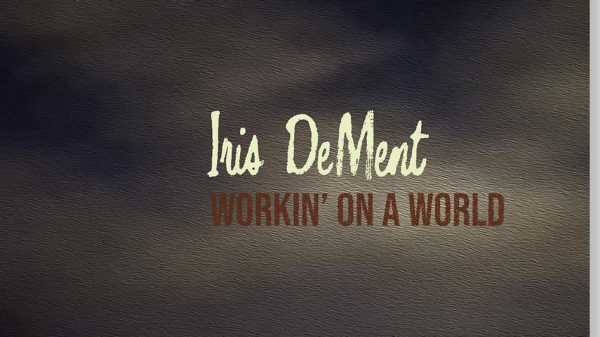
The singer-songwriter Iris DeMent’s first three albums arrived like clockwork, every two years, through the heart of the mid-nineteen-nineties. Each album featured bittersweet stories of blue-collar love, limits, and loss, sung in her bracing Arkansas twang. Since then, new DeMent albums have become more rare, and more precious. As the years between them stretched, DeMent told those who asked about the next album that she simply hadn’t written twelve songs she wanted to make a record out of. The explanation pointed to a perfectionist streak, and also to a hard-earned willingness to be patient with herself when inspiration stalled. It hinted, too, at the depression-fuelled writer’s block that DeMent, who is now sixty-two, has discussed frankly in interviews. Her new album, “Workin’ on a World,” is her first in eight years, her first of original material since 2012, and only her third album this century. It is also the loosest and most urgent recording of her career, and one of the most pointed and sustained political statements made by a musician working primarily in country.
Political stands are not new for DeMent. Some fans who first fell for bittersweet ballads such as “Mama’s Opry,” about her mother’s unrealized dreams of becoming a country singer, or the elegiac “Our Town” were startled, even angered, when she included the righteous progressive broadside “Wasteland of the Free” on “The Way I Should,” her 1996 album. (A representative couplet: “We kill for oil, then we throw a party when we win / Some guy refuses to fight, and we call that the sin.”) When a Republican state senator, John Grant, heard the song on a Tampa community-radio station, WMNF, he led a successful effort to eliminate the station’s funding from the state budget. DeMent did a benefit concert for the station; state funding was later restored.
On the new album, DeMent sings as an artist aware of the risks of speaking out yet determined to get to work, as in a rousing eight-minute litany of gratitude and complaint that begins, “I’m goin down to sing in Texas / Where anybody can carry a gun / But we will all be so much safer there / The biggest lie under the sun.” (The first line gives the song its title.) On a later verse, she points to another key influence on the new album: “It’s been way too long comin’,” she sings, “but I want to thank the Chicks.” Twenty years ago next month, days before the United States invaded Iraq, Natalie Maines, the lead singer of the country trio the Chicks, née the Dixie Chicks, told a London audience, “We do not want this war, this violence, and we’re ashamed that the President of the United States is from Texas.” Maines’s offhand expression of dissent resulted in the effective blacklisting of the Chicks’ music on mainstream country-radio playlists, and in death threats for Maines and her bandmates, Martie Maguire and Emily Strayer.
Eleven days later, after the bombs had begun to fall, DeMent made a small protest of her own, declining to sing at a concert in Madison, Wisconsin. She told the crowd that performing that night would “trivialize the fact that my tax dollars are causing great suffering, and sending a message that might makes right.” DeMent was not as famous as the Chicks, but she also got death threats. “It gave me a whole different view of the world we’re in these days,” she told me, in 2004.
DeMent remains a traditionalist; her work is rooted in earlier sounds. Her distinctive voice will always boast the twang and drawl of the place where she was born, between the Mississippi River and the Ozark Mountains, and her church-born piano, plain but spirited, is the engine to nearly every song on the new album. But she has also emerged, somewhat unexpectedly, as an occasionally experimental artist. On her previous album, “The Trackless Woods,” from 2015, she set to music English translations of poems by the Russian modernist Anna Akhmatova. Two of DeMent’s new songs—“The Cherry Orchard,” inspired by the Chekhov play, and “I Won’t Ask You Why”—move so slowly and carefully it is as if she were discovering each word only a split second before voicing it. Beyond merely intimate, these songs feel private.
But the thrust of “Workin’ on a World” couldn’t be more public. Often, the lyrics are closer to commonsense kitchen-table talk than to poetry. “We drown in ill will or we swallow the pill,” she sings. And elsewhere: “Life is no respecter of persons. Even little children’s hearts get torn to shreds.” On “The Sacred Now,” written with her stepdaughter, the singer-songwriter Pieta Brown—who is also one of the album’s producers—DeMent sings, “Those who stand to gain / Draw dividing lines / You’re over there with yours / I’m over here with minе.”
“The Sacred Now” is a first for DeMent’s catalogue: a straight-up pop-rock record. But, on that song and others, it’s DeMent’s singing that sounds newest of all. Her voice still recalls early heroes of hers such as Loretta Lynn and Sara Carter, and her phrasing will likely always evoke the wry but earnest tone of her late friend and mentor John Prine. But she has never sung so freely before. Early in her career, DeMent’s easeful vocals were often misapprehended as sweet rather than bittersweet, and innocent rather than worldly wise. Here, the better to underscore her themes, DeMent lets us hear that singing is hard work but worth it. She heaves up and into one syllable, collapses into the next. There is less enunciation than we’ve come to expect from her, but more innervation.
The most daring, unexpected vocal on the album comes on “Let Me Be Your Jesus,” which DeMent sings from the point of view of Donald Trump, or some similar despot, and which hits like Randy Newman’s slave-trader-voiced “Sail Away.” Her vocals sound sickeningly sweet, sibilant and unctuous—like a serpent’s, as it tempts the world.
Country music, even when defined broadly, has never been known for its radical politics. The genre typically avoids explicit political statements altogether, and many country songs take it for granted that the way things have always been is the way they should be, perpetually reinforcing all the traditional hierarchies in the process. DeMent’s album confronts these assumptions, usually with generosity rather than condemnation. In one deeply affecting verse in a song called “Nothin’ for the Dead,” DeMent sees a small boy dressed exactly like his father, crying on his mother’s lap. “From the cradle poured straight into the mold,” she muses. “It’s kinda sweet but kinda sad. / Don’t be fooled, there is no separating the good stuff from the bad.”
Back when she released “Wasteland of the Free,” DeMent’s dissenting voice was nearly solitary in country circles. So it came as a welcome jolt last year to see so many newer country and country-adjacent artists leaning in DeMent’s direction. Molly Tuttle, who just won the Best Bluegrass Album Grammy for “Crooked Tree,” put out a song called “Big Backyard,” a joyous, sing-along invitation to a party where everyone’s welcome. On his album “Peculiar, Missouri,” the queer indie-folk troubadour Willi Carlisle seemed to amen Tuttle’s inclusive call with his own “Your Heart’s a Big Tent.” Adeem the Artist, on their album “White Trash Revelry,” sang matter-of-factly about being nonbinary and growing up poor. Miko Marks and the Resurrectors showed their mastery of all manner of gospel-inflected roots rock on an album called “Feel Like Going Home,” which includes “Trouble,” a song that evokes the work that the civil-rights leader John Lewis liked to call “good trouble.”
One of DeMent’s new songs, “Warriors of Love,” also evokes Lewis, and other civil-rights workers, standing their ground, causing good trouble. “Look around and you’ll see people still building the beloved community,” she sings, adding, “people in a fix, willing to risk an early ride in the hearse.” DeMent has fashioned an album that not only speaks to this hard political moment but that challenges her listeners to put in the work to create a more loving world, together, no matter what comes. As she declares in the first verse of “Goin’ Down to Sing in Texas,” “Go ahead and shoot me if it floats your little boat / I’ll live by my conscience even if that’s all she wrote.” ♦
Sourse: newyorker.com






